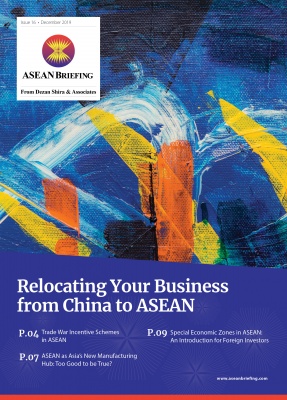
Relocating Your Business from China to ASEAN
Published: December 2019ASEAN countries have become an alluring destination for Chinese-based businesses looking to benefit from the cost-savings of relocating all or part of their production facilities to Southeast Asia amid the brewing US-China trade war. In this issue of the ASEAN Briefing magazine, we begin by introducing the different incentives issued by ASEAN countries to attract investments from the spillover of the trade war. We then analyze productivity levels in ASEAN and what impact this has on businesses relocating to the region. Finally, we focus on special economic zones (SEZs) in ASEAN and their increasing importance in garnering foreign investments at a time of global economic uncertainty.
ASEAN countries have become an alluring destination for Chinese-based businesses looking to relocate all or part of their production facilities amid the brewing US-China trade war. ASEAN was already China’s largest trading partner in the first half of 2019 as trade turnover increased by 10 percent from 2018 at US$294 billion; overtaking the US for the first time since 1997.
Some investors, however, remain skeptical at the idea of relocating to an ASEAN country, citing the bloc’s lack of developed supply chains and infrastructure. While these are genuine concerns, ASEAN’s growth rates have stabilized at just over four percent in 2019. The bloc has also well-established trade networks, such as the ASEAN-China free trade agreement and is home to prominent international businesses engaging in conventional and nuanced industries. Additionally, ASEAN hosts a young and educated workforce and growing middle-class.
In this issue of the ASEAN Briefing magazine, we begin by introducing the various incentives issued by ASEAN countries to attract investments from the spillover of the trade war. We then analyze productivity levels in ASEAN and what impact this has on businesses relocating to the region. Finally, we focus on special economic zones (SEZs) in ASEAN and their increasing importance in garnering foreign investments at a time of global economic uncertainty.

